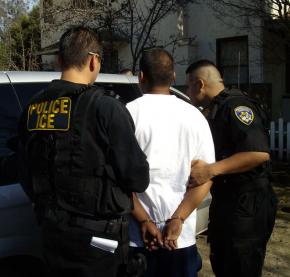Chicago activists challenge deportation
reports on a campaign to defend a 21-year-old college student and immigrant rights activist.
CHICAGO--A 21-year-old college student who has spent the majority of his life in the U.S. is facing deportation following a traffic stop. But activists and allies are building a campaign to stop this injustice.
On January 18, Rigo Padilla, a leader of the Organization of Latin American Students at Harold Washington College, was detained for a traffic violation. A public defender interviewed him and noted that Padilla was not a U.S. citizen. The public defender then walked out of the first and only interview they had.
Within minutes, an Immigration and Customs Enforcement (ICE) agent arrived. Padilla was interrogated about what country he was originally from, how old he was when he came to the U.S., how he came to be in the U.S., and where the rest of his family resides. After the interview, he was transferred to a federal prison, where a second ICE agent interrogated him.
As Padilla said in an interview:
Once I spoke to the immigration [ICE] person at [Cook County Jail], they put an immigration hold onto my account, which meant that I would not be released until ICE was given 48 hours to pick me up. ICE always comes to pick up people.
I was not aware of this until my lawyer came in and told me that paying bond would not guarantee I would be released. I was picked up within a day after my bond was paid and transferred to immigration. During the transfer, the driver [for ICE] encouraged everyone to just sign the letter of deportation, and said that that was the best thing for us.
In federal prison, Padilla was given two options. The first was to pay bond and the second option was to wear a tracking bracelet on his ankle. As draconian as a tracking bracelet might seem, under current ICE regulations, this was a "privilege" given to Padilla for not having any previous offenses.
The fact that Rigo Padilla is facing deportation at all is a violation of the law. In 1985, then-Mayor Harold Washington signed an executive order prohibiting city employees from enforcing federal immigration laws. The order was made into a law by the Chicago City Council in 2006, making Chicago a "sanctuary city" for undocumented immigrants.
As Padilla's case shows, however, the Chicago Police Department and Cook County officials are continuing to destroy lives with their illegal collaboration with ICE.
Padilla now faces immigration proceedings in early April, where a judge could sentence him to be deported to Mexico, a country that is entirely foreign to him (Padilla has not been to Mexico since he was 6 years old).
Even before Padilla became a target of ICE, he was facing the same struggle that an estimated 60,000 undocumented students face each year when graduating from high school--how to pay for higher education.
Padilla had attended the University of Illinois-Chicago for one semester, until the burden of paying for a public university became too much. Since then, he has been an active student at Harold Washington College and, as president of the Organization of Latin American Students, has been an advocate for the rights of Latin American immigrants and brought attention to the effects of making people illegal in a country that they help build.
Activists are vowing to support Padilla's efforts to remain in the U.S. They are organizing the Campaign to Save Rigo Padilla and want to send a message to ICE: Hands off Rigo Padilla. No human being is illegal!



